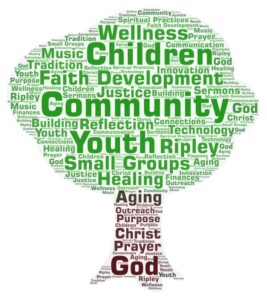-
Strategic Plan Update
- Posted on April 27, 2021
- by Sarah Marino
- in Community, Latest News, Ministries/Task Force News
- Comments Off on Strategic Plan Update
From the Leadership Team…
We are grateful to all who have engaged in the dialogue regarding FCCW’s Strategic Plan over the past few months. Through our meetings with ministries, the 3/25 congregational discussion, and many individual exchanges, we have heard and learned a lot. We’d like to take a few moments to share where we are — and where we think we’re going!
First, a little grounding.
The Leadership Team’s foremost responsibility is to ensure the “achievement of the purpose and mission of the Church on behalf of the Congregation.” As the strategic decision-making body for FCCW, it is incumbent on us to seek and understand the concerns and desires of the congregation; that’s why we’re so thankful for your input.
Fortunately, our community of God is comfortable with the process of self-reflection — we know how to discern and strategize! Our ability to launch a strategic plan in 2021 has been facilitated by the careful examinations that have taken place in advance of this effort. Those immersions (Holy Conversations, Holy Destinations, Transition Team) gave rise to our purpose statement and empowered us to be even more attentive to the refreshing winds of God’s spirit.
Current times have presented additional overlays.
Today, there are new challenges. The decline of UCC membership is a shared concern nationwide. “How do we draw more people in?” is a constant refrain among church leaders and at UCC conferences. Thankfully, FCCW has successfully navigated a natural transition period with a change in lead pastor, and its membership is now holding steady — likely due to our vibrant spiritual offerings and engaged congregation. And while we remain dedicated to the needs and blessings of our current members, we must also continue to find ways to share our faith, love, and hope with others.
Covid, racial injustice, environmental crises, and ongoing societal inequities have been added to the lens through which we see the world — and through which we determine FCCW’s role in the community. Needless to say, these topics are complex and demanding of our time.
How does a strategic plan help?
The rigor of working through a strategic plan causes organizations to focus on what is needed to move forward with intentionality. The discipline of self-evaluation helps us to determine how the various components of our church can work most effectively together to advance our purpose and address the challenges of the day.
Several critical inputs have informed our thinking: extensive LT strategic planning work, results from the congregational survey, directional feedback from the lead pastor’s review, planned staff departures, the congregational budget meeting discussion, and more recently, the excellent dialogue around the proposed plan. These various sets of feedback led us to three primary strategic objectives: deepen faith through community and small groups, grow the children, youth, and family program, and branch out through worship, arts, and justice work — all supported through a sustainable root system of steady/growing membership, thoughtful financial stewardship, and sustainable facilities planning.
So, what does it all mean?
In the near term, it means that we are moving ahead with the very exciting process to hire an Associate Pastor for Youth and Families. A search committee has been identified and that group will be commissioned and blessed at our annual meeting on Sunday 5/16. The establishment of this ordained position builds on the role that Associate Pastor Judy played for many years in support of our youth. In addition to attending to the spiritual needs of FCCW youth, the role will serve the entire congregation through preaching, performing sacraments, and pastoral care — and will also focus on integrating adult and children/youth activities. A Children’s Program Director will be hired to manage day-to-day operations. We are fortunate to have the careful guidance of our UCC conference liaison on this important effort.
Our community’s deeply held desire to engage meaningfully in small group settings will become an even stronger area of focus as a supplement to the ongoing work of current ministries. Topics such as bible study, vocation, aging, parenting, healing, health and wellness, reflective spiritual practices, visitation, and many other avenues for creating and nurturing spiritual connections will be encouraged and fostered. In fact, we have started to assemble topic-specific teams to explore how best to implement our small group infrastructure.
Through expanded Ripley Spirituality and the Arts programming for adults, children, and families, increased opportunities to advance social justice, and enhanced technology and online capacity, our goal is to broaden our reach into the community and beyond.
Specific questions have been asked about the Health and Wellness Ministry. While the future staffing proposal does not include a dedicated staff person, the strategic plan failed to make clear that the important work of the Health and Wellness Ministry will, of course, continue. We apologize for creating some confusion on that front. We will work closely with Kathleen Zagata over the next two years to prepare for that transition. In short, we have the time and intention to give our Health and Wellness Ministry what it needs to thrive and to discern avenues of connection and pastoral outreach to our entire community.
Thank you!
We are buoyed up by your observations, reflections, and encouragement as we work together to ensure the long term vitality of our beloved church and its God-loving community.
The Leadership Team: Sarah Gallop (Moderator), Marianne Carter (Clerk), Bruce Lauterwasser (Treasurer), Nancy O’Connor, David Peretti, Marty Rozmanith, Jason Ryan, Cindy Wankowicz, and Jennifer Wilson — in collaboration with the Ministry Team







